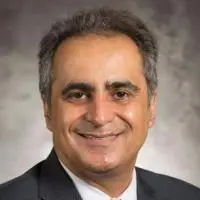Vahid Tarokh
The Rhodes Family Professor of Electrical and Computer Engineering, Duke University. Ph.D. - University of Waterloo.
Recommended book categories
Professor Tarokh has recommended books in the following areas:
Vahid Tarokh is the Rhodes family professor of electrical and computer engineering, Bass Connections Professor, a professor of mathematics (secondary), and computer science (secondary) at Duke University. He is also a Microsoft Data Science Investigator at Microsoft Innovation Hub at Duke University.
He received the M.Sc. in Mathematics from University of Windsor, Ontario, Canada in 1992, and the PhD in Electrical Engineering from the University of Waterloo, Ontario, Canada in 1995. He worked at AT&T Labs-Research and AT&T Wireless Services until August 2000 as Member, Principal Member of Technical Staff and, finally, as the Head of the Department of Wireless Communications and Signal Processing. In September 2000, he joined the Massachusetts Institute of Technology (MIT) as an Associate Professor of Electrical Engineering and Computer Science. In June 2002, he joined Harvard University as a Gordon McKay Professor of Electrical Engineering and Hammond Vinton Hayes Senior Research Fellow. He was named Perkins Professor of Applied Mathematics and Hammond Vinton Hayes Senior Research Fellow of Electrical Engineering in 2005.
In Jan 2018, He joined Duke University, as the Rhodes Family Professor of Electrical and Computer Engineering, Computer Science, and Mathematics and Bass Connections Endowed Professor. From Jan 2018 to May 2018, He was also a Gordon Moore Distinguished Scholar in the California Institute of Technology (CALTECH). Since Jan 2019, he has also been named as a Microsoft Data Science Investigator at Duke University. He has supervised 35 Post-doctoral Fellow and 16 PhD students; about 50% of these are Professors at Research Universities, and the rest are research scientists at various US Government sponsored (Lincoln Labs, NASA), and industry research labs. In addition to these, he has supervised 12 M.S. thesis, one undergraduate thesis, and three M.S. non-thesis students. In the summer of 2016, Dr. Tarokh supervised 6 (mainly underrepresented) High School Summer Student Research on development of tactile gloves and applications while volunteering under a United States Army Education Outreach HSAP Program https://www.usaeop.com/.
Tarokh has received a number of awards including the Governor General of Canada Academic Gold Medal 1996, the IEEE Information Theory Society Prize Paper Award 1999, The Alan T. Waterman Award 2001 and was selected as one of the Top 100 Inventors of Years (1999–2002) by Technology Review magazine. In 2002, the IEEE Communications Society recognized him as the co-author of one of the 57 most important papers in all society’s transactions during the past 50 years. He was named a Guggenheim Fellow in Applied Mathematics for his contributions to the theory of pseudo-random matrices. He holds four honorary degrees.
His current research interests are in representation, modeling, inference and prediction from data, and the design of organic machines.
Awards and honors
-
Elected to the National Academy of Engineering (2019).
-
Gordon Moore’s Distinguished Scholar (2017).
-
2016 Honorary Dr. Tech. H.C. University of Southern Denmark
-
Sciencewatch World’s Most Influential Scientific Minds (2014).
-
2014 Thomson Reuters Highly Cited Researcher (Based only on published papers between 2002-2012).
-
2014 IEEE Communications Society Award for Advances in Communications
-
Honorary D. Sc., Concordia University, 2013
-
2013 IEEE Eric E. Sumner Award
-
2012 IEEE TCCN (Technical Committee on Cognitive Networks) Publication Award
-
Guggenheim Fellowship, 2011
-
IEEE Fellow, 2009
-
Honorary D.Sc., The University of Windsor, 2003
-
IEEE Communications Society 50th Anniversary Recognition (Named by the IEEE Communications Society as the author of one of the most important 57 papers published in society’s transactions in the past 50 years), 2002
-
TR100 Award (Selected as one of the top 100 inventors of the year by the Technology Review Magazine), 2002
-
Alan T. Waterman Award 2001
-
IEEE Information Theory Society Prize Paper Award, 1999
-
Governor General of Canada’s Academic Gold Medal, 1996
